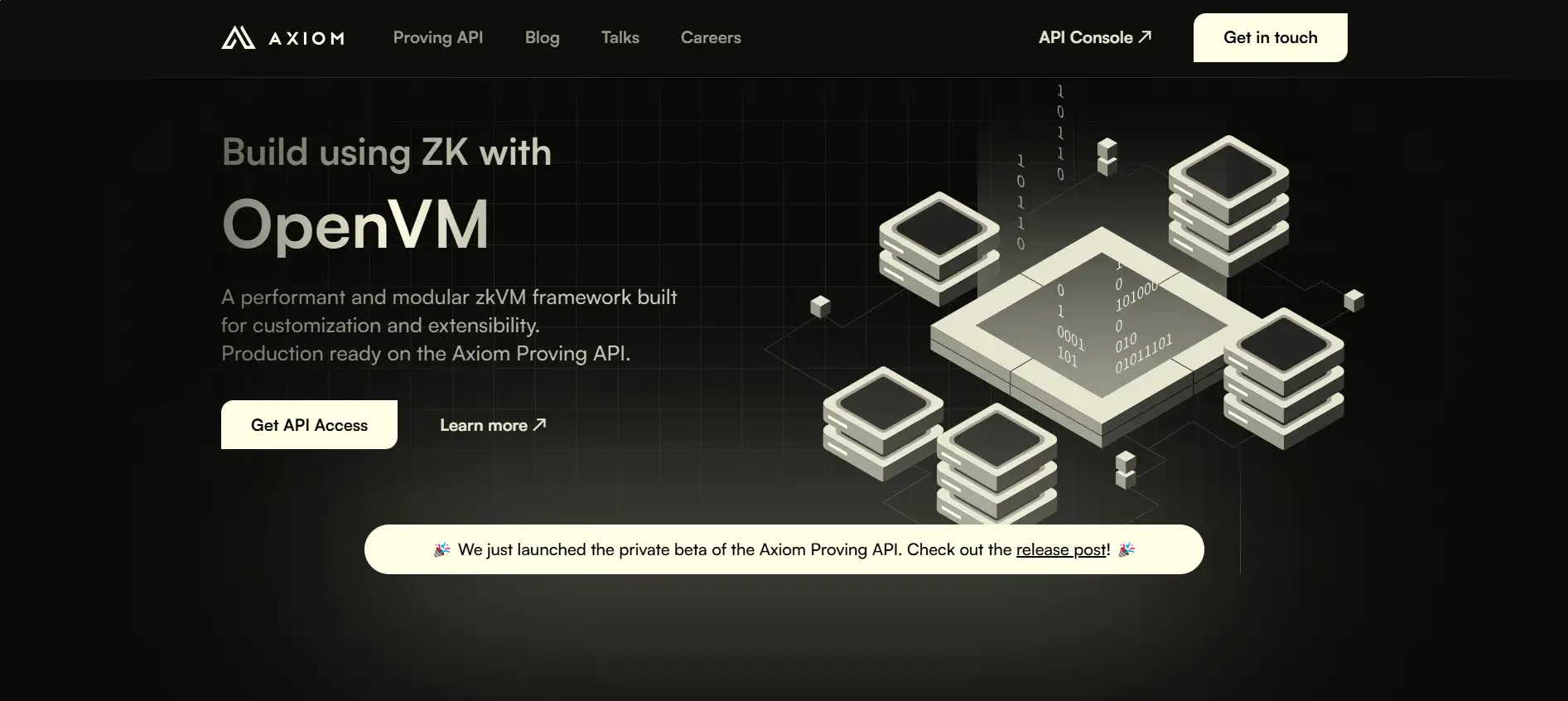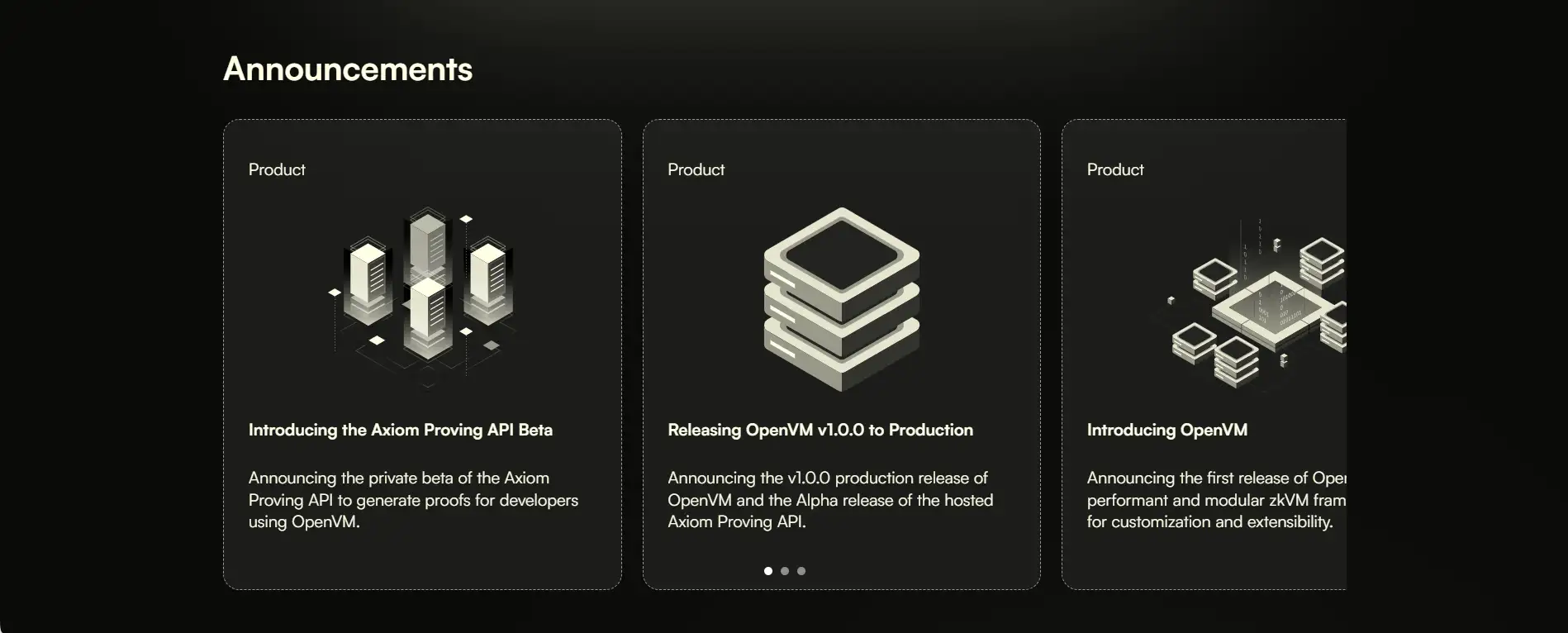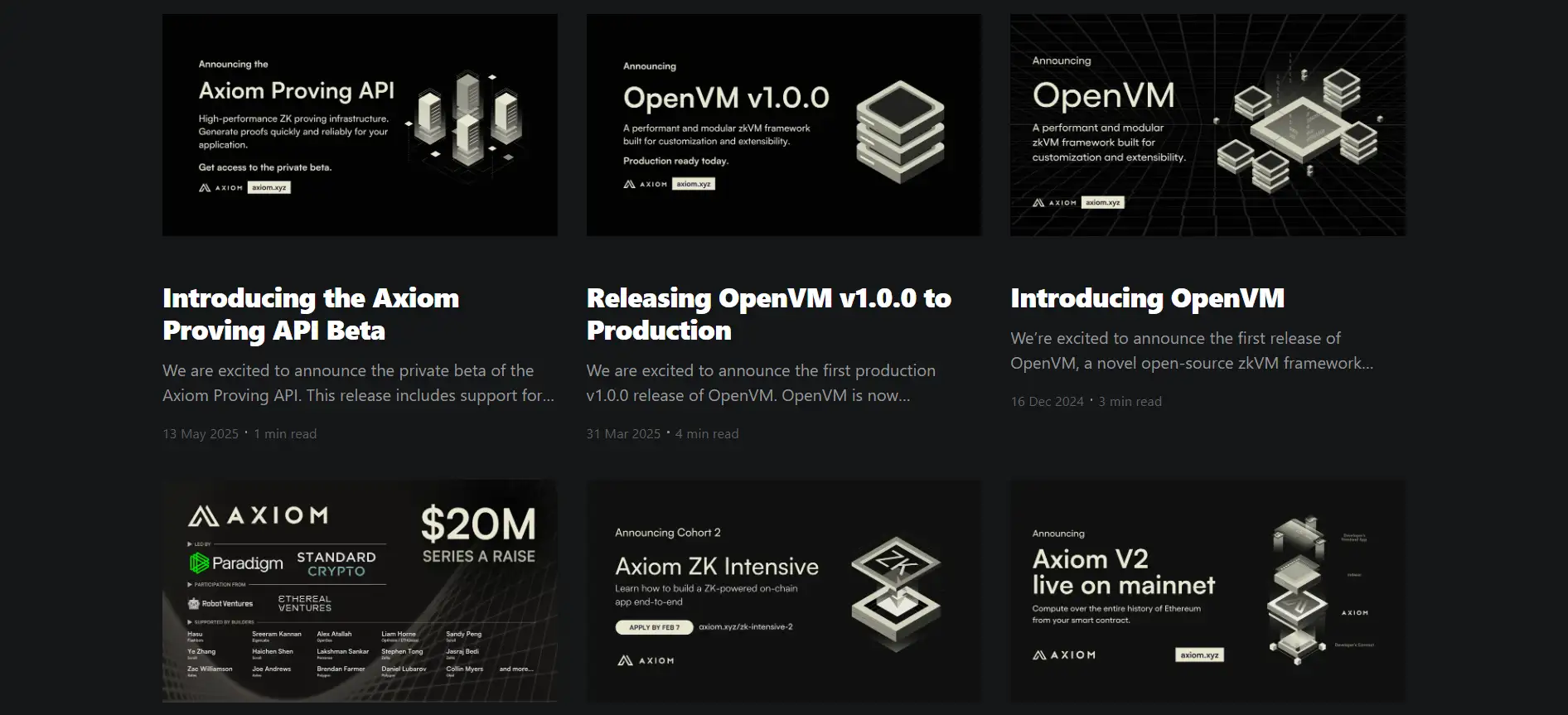About Axiom
Axiom is a cutting-edge ZK coprocessor platform for Ethereum that provides smart contracts with trustless access to all historical on-chain data and enables expressive compute directly on-chain. The core idea is to empower developers by enabling complex, verifiable computations on-chain, something that has traditionally been impossible due to scalability and cost constraints. Through a zero-knowledge (ZK) architecture, Axiom drastically expands what smart contracts can accomplish without compromising trust or decentralization.
Designed for developer ease and application extensibility, Axiom allows queries into Ethereum’s entire history and validates them with ZK proofs. This is similar to how oracles serve data today, but in a fully trustless, verifiable way. With this design, Axiom acts like a GPU for smart contracts — extending their capabilities without needing fundamental changes in architecture. Backed by top investors like Paradigm and Standard Crypto, and supported by a passionate development team, Axiom is quickly becoming a foundational layer for data-intensive decentralized applications.
Axiom delivers a high-performance infrastructure for zero-knowledge proof generation and verification, giving smart contracts the ability to reason over past on-chain states and perform advanced off-chain computations. This is made possible through its Proving API and the innovative OpenVM — a modular, production-ready zkVM framework tailored for extensibility. At its core, Axiom aims to unlock scalable, cost-efficient compute capabilities that don’t sacrifice Ethereum’s security guarantees.
One of the major limitations of today’s smart contracts is their inability to access and compute over historical blockchain data in a scalable way. Axiom solves this by offering verifiable read access to the Ethereum archive via its smart contract integrations and light client proofs, which are validated with ZK-SNARKs. This enables practical use cases like trustless analytics, historical data analysis, off-chain governance validation, and decentralized oracle alternatives. Examples include calculating time-weighted average prices (TWAP) for DeFi protocols or verifying validator signatures over time for staking applications.
The project has seen several development milestones including the production launch of OpenVM v1.0.0 and the private beta release of the Axiom Proving API. These components allow developers to integrate Axiom directly into applications using familiar tools like Solidity and standard JSON-RPC interfaces. Axiom provides transparent documentation, a developer console, and a testnet demo to showcase its capabilities in real-time.
In terms of ecosystem, Axiom’s positioning sets it apart from traditional oracles like Chainlink or Band Protocol by removing the need for trust assumptions. It also distinguishes itself from data indexing platforms like The Graph by focusing on ZK-based validation and smart contract interoperability rather than off-chain data aggregation. With use cases ranging from trustless accounting and governance to predictive modeling and oracles, Axiom is building a new paradigm for dApp logic.
Axiom provides numerous benefits and features that make it a standout project in the zero-knowledge ecosystem:
- Trustless Data Access: Query any historical Ethereum data directly from smart contracts with zero-trust assumptions, backed by ZK validity proofs.
- High-Performance Proving API: Enables developers to generate proofs for complex compute efficiently with scalable infrastructure.
- OpenVM zkVM Framework: A modular and extensible zkVM engine that allows full customization of circuits, proof systems, and deployment strategy.
- Advanced Use Cases: Supports TWAP calculations, trustless voting, historical asset tracking, and machine learning inference directly on-chain.
- Fully Open-Source: Both the proving circuits and smart contracts are open for contributions and review, ensuring full transparency.
- Production Ready: Recently audited and deployed in production, making it ready for integration into real-world decentralized applications.
Axiom provides developers with a structured way to start building ZK-powered applications using trustless access to Ethereum data. Here's how to get started with the platform:
- Explore the Official Website: Visit the main site at axiom.xyz to understand the project’s goals and latest updates.
- Try the Live Demo: Interact with working examples like proving account age or retrieving Uniswap TWAPs. Check the documentation for more information at Axiom docs.
- Read the Blog: Stay informed on product releases and technical breakdowns through the blog at axiom.xyz/blog.
- Join the Community: Connect with the Axiom team and other developers on Twitter and Discord.
- Access the Codebase: Explore open-source circuits and smart contracts at github.com/axiom-crypto.
Axiom FAQ
Axiom eliminates the need for traditional data indexing by providing direct, ZK-verified access to historical Ethereum data. Instead of relying on third-party indexers or off-chain infrastructure, developers can make precise queries on-chain and receive zero-knowledge proof-backed results. This approach allows developers to bypass platforms like The Graph and instead use Axiom to compute over blockchain history with full transparency and cryptographic security.
Yes, Axiom enables developers to replace off-chain governance tools like Snapshot by offering on-chain, ZK-verified voting logic. This means voting power, ballots, and results can be computed off-chain but verified on-chain using zero-knowledge proofs, eliminating the need for multisig enforcement or centralized execution. With Axiom, DAOs can maintain full decentralization without compromising on efficiency or transparency.
Axiom uses an on-chain cache of Merkle roots to efficiently represent and access historical block data. This allows it to verify massive data sets with minimal on-chain overhead using recursive ZK proofs. By batching Ethereum block hashes into Merkle roots, Axiom can validate complex historical queries without needing to recompute or re-import data each time. These efficiencies are built into the AxiomV0 smart contract and accessed via the Proving API.
OpenVM is the core zkVM powering Axiom’s proving infrastructure. It provides a customizable environment for building and running ZK circuits, letting developers choose their own instruction sets, proof systems, and circuit optimizations. This modularity allows Axiom to support everything from analytics and cryptographic validation to machine learning inference in a ZK context. With its production-ready release, OpenVM is central to Axiom’s flexibility and extensibility.
Axiom brands itself as a ZK coprocessor because it performs on-chain computation rather than just feeding external data into smart contracts. Unlike traditional oracles like Chainlink, which act as data bridges, Axiom allows smart contracts to execute complex logic over on-chain history and verify the results through ZK proofs. It effectively adds a computational layer to Ethereum, transforming smart contracts into more powerful, data-rich applications.
You Might Also Like












